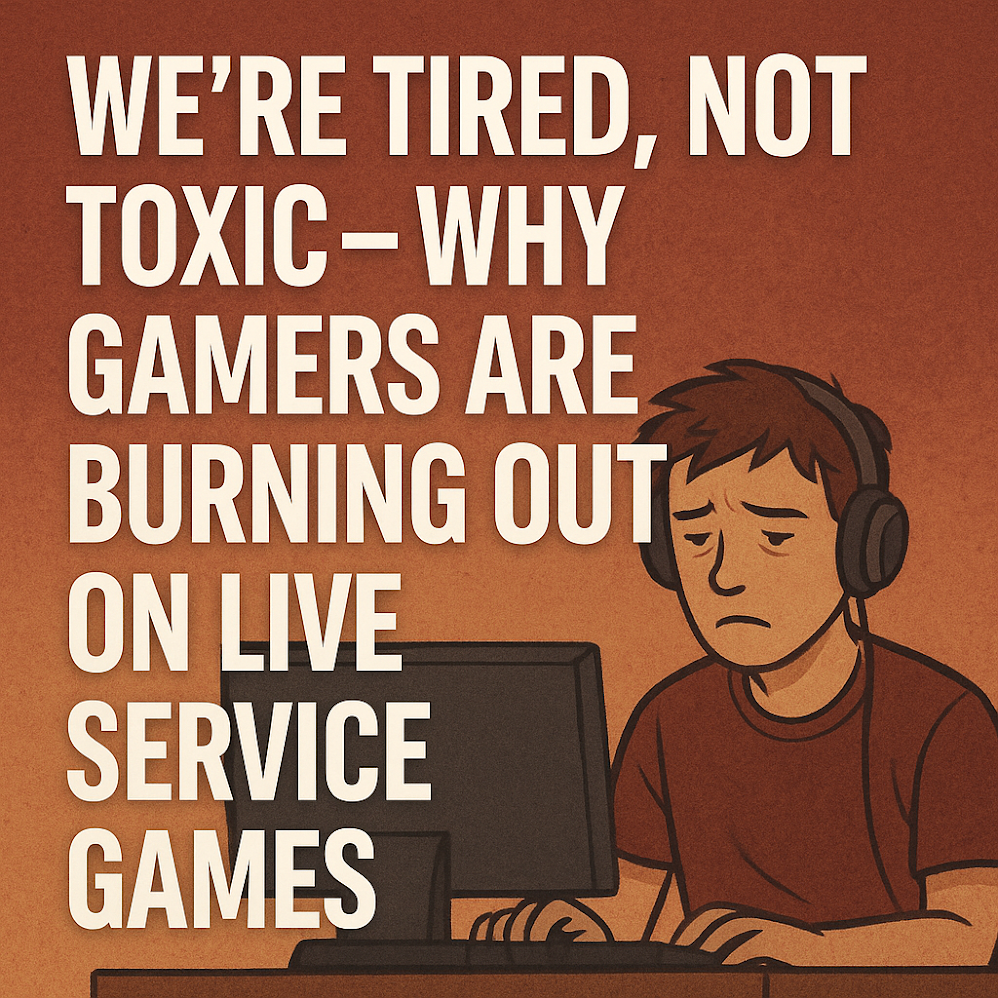We’re Tired, Not Toxic — Gamers Are Burning Out on Live Service Nonsense
I used to boot up my console just to relax after a long day — kick back, explore new worlds, get lost in a story, or maybe run a few multiplayer rounds with friends. But now? Every time I load into a live service game, I feel like I'm clocking into a shift at a job I never applied for.
The battle pass timer ticks away, the daily quests stack up, limited-time events yell at me from the home screen. “Play now or lose out forever!” It’s exhausting.
And I’m not the only one feeling this way.
In 2025, we’re not just experiencing a shift in how games are made — we’re watching players finally push back against a model that’s been stretched thin, milked dry, and, honestly, feels creatively bankrupt.
🎮 When Did Gaming Become Homework?
Let’s be real. The live service model used to be exciting. When Fortnite blew up, it was fresh. Constant updates, zany events, crossover madness — it worked. Games like Warframe and Destiny 2 found ways to keep content flowing without losing too much of their soul.
But what was once innovative is now saturated. Every publisher wants their “forever game,” and the result is a swamp of content loops that don’t respect your time.
You log in, and instead of fun, you get chores. “Collect 10 fragments.” “Win 5 matches with this class.” “Play every day for 14 days or lose access to rewards.” Suddenly you’re gaming out of obligation, not joy.
🧠 The Mental Load Is Real
What nobody talks about enough is the psychological toll of these systems. FOMO — fear of missing out — is built into the very DNA of live service games. Limited-time skins. Seasonal rankings. Event-exclusive loot. All of it screams: you better not miss a day.
But here’s the kicker: we’re adults. We have lives. Jobs. School. Families. Responsibilities. And even if we didn’t, we deserve games that are built to enrich our time, not manipulate it.
I've seen friends drop hobbies because a game demanded too much of them. Others feel guilt just for skipping a few days of play. This isn’t how games should make people feel.
💀 Not Every Game Needs a Battle Pass
Here’s a thought: what if more games just… ended? Not in a bad way — but like how they used to. You play through a story, complete it, maybe dip into multiplayer a bit, and move on. No pressure to “keep up.” No content treadmill.
There’s something beautiful about closure. About finishing a game, feeling satisfied, and remembering the experience without worrying about what you missed.
Not everything needs to be an ongoing ecosystem. Sometimes we just want a damn good game — start to finish.
📉 2025's Graveyard of Live Service Games
Look around — the signs are everywhere. Live service games are folding left and right. Suicide Squad: Kill the Justice League flopped hard. Babylon’s Fall didn’t last a year. Knockout City, a genuinely fun game, couldn’t survive the model. Even Halo Infinite struggled under the weight of an inconsistent content pipeline.
The message is clear: players don’t have infinite time, and the market doesn’t have infinite space.
You can’t expect players to juggle six games that each want 10 hours of attention every week. Something’s gotta give — and it’s usually our patience.
🕹️ Single-Player Games Are Thriving
What’s interesting is how, while some live service games are crashing and burning, single-player games are thriving again. Elden Ring, God of War: Ragnarok, Baldur’s Gate 3, Spider-Man 2 — they all crushed it, both critically and commercially.
Why? Because they’re complete. Polished. Respectful of your time. They let you play at your own pace. You can take a break, come back months later, and not feel punished or lost.
Even Resident Evil 4 Remake sold like crazy — and that’s a straight-up old-school experience. No seasons. No passes. Just tight design and pure fun.
👏 Indies Are Leading the Charge
We’ve also gotta shout out the indie scene. Games like Hades, Vampire Survivors, Dave the Diver, and Celeste are winning hearts without a single battle pass between them.
These games aren’t built around “user retention.” They’re built around passion, design, and creativity. You can feel the difference — they’re made by people who love games, not just love monetization.
A lot of indie devs are proving that you don’t need a massive budget or live team to create something meaningful. You just need to respect the player’s time and intelligence.
💸 Stop Selling Us Back Our Own Time
What’s really frustrating is how obvious the manipulation has become. Pay-to-skip mechanics. XP boosts. Premium tiers that let you earn rewards faster. It’s like these games are built to waste your time just so they can sell it back to you.
You grind because the systems are designed to make you feel like you're missing out unless you cough up extra cash. It’s not even subtle anymore — and people are starting to wise up.
Gamers aren’t cheap. We’re willing to pay for value. But we’re not here to be milked through FOMO traps and progression walls.
🚀 The Future Should Be Player-First
So where do we go from here?
We need more games that treat players like people, not monthly active user stats. We need studios to understand that sustainable fun beats aggressive monetization. We need fewer games that beg for our time and more that deserve it.
The live service model isn’t evil. Done right, it can be awesome. But right now? It’s overused, underwhelming, and burning out the very people it claims to serve.
Give us back the magic. The mystery. The freedom to step away without falling behind.
Because at the end of the day, gaming should feel like play — not pressure.
Written by GameMorale — because someone’s gotta say it like it is.



Comments
Post a Comment